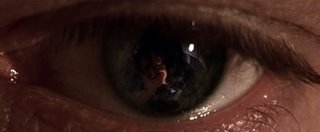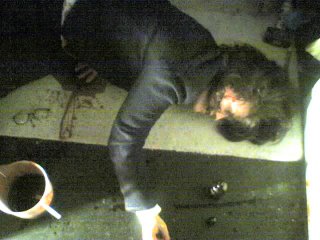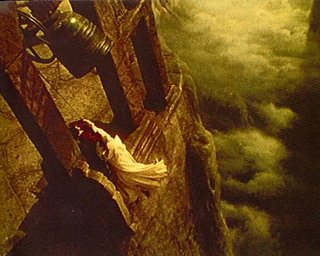
I’ve pretty much finished Through A Vulture Eye now. Spent yesterday mixing the sound and doing a grade (although the lighting, by John Ross and Chris Cooke, was spot on in terms of colour, I just needed to do a couple of tweaks) and now I just need to get the final titles, which Jeanie is doing for me.
I’m really happy with the finished film, although it’s always a bit strange when you finish something and suddenly the story seems revealed – it becomes a whole thing, rather than just a collection of parts. It’s also strange when you’re writing first person narratives (the whole of the film is narrated in voice-over), especially ones that are about knifing women to death – it can’t help but make you feel a bit self-conscious about how it sounds.
If you watch enough horror films, you get attuned to the genre – you figure out how it works (or how it’s supposed to work) and you slip into a way of watching that encompasses your history of viewing horror. What you forget is that for people who don’t watch horror films on a regular basis, that history is missing, and the reasons for showing gore and violence are hard to understand and, potentially, suspiciously motivated.
It goes back to the question ‘Why do you want to make horror films?’ which often comes out of an underlying question ‘What makes you think that knifing/bludgeoning/chainsawing people to death is entertaining?” I think that there’s often a misapprehension that people who like to watch horror films like to get off on violence (and I’m sure there probably are) – they see the horror on screen, the reaction it elicits in a horror audience (maybe a kind of squirming delight) and they conflate that into a supposition that it is the wish to commit those acts, however deeply hidden, which is at the root of the enjoyment.
In fact, for a lot of horror fans, the delight comes not from an identification with the aggresssor, but with the victim – and the things that make horror enjoyably disquieting are the ideas that the violence throws up – look how mutable the body is, see how fragile and yet resilient it is, look at how senseless, evil or insane people can be – it throws up possibilities, fears, dangers that we might not otherwise appreciate.
A lot of films which might be touted as horror, often make an attempt to add another layer of meaning or importance or relevance to what they are doing. Rather than being ‘just’ a horror film, it might be described as being a metaphor about illness, or a satire on consumerism, or a psychological portrait. Obviously, there are horror classics which are each of these things – I’m not saying that horror films can’t do these things, just that a lot of times it seems that people are a little embarassed of making ‘just’ a horror film and try and develop it into something with more ‘meaning’. But the best horror films are often successful because they don’t try too overtly to tack on other meanings – the meanings and themes come out of the horror rather than being layered over the top of it. Horror films can be emotionally resonant, socially critical, psychologically perceptive, but they don’t need to stop being horror films to do this.
It’ll be interesting to see the range of films we get for Mayhem, the horror short film festival I’m helping to organise at Broadway in Nottingham next month. So far (hopefully) we’ve got shorts from Brazil and Germany as well as a load from the region, alongside a special preview screening of the new British feature ‘Wilderness’. There does seem to be a lot more interest in horror at the moment, with short filmmakers from the region beginning to get their horror ideas funded.
I’ve got another few short ideas that I want to get on with, now that TAVE is almost done. I’m still trying to keep them doable with a small cast and crew, using any locations I can get hold of (there’s only so many times I can shoot stuff in our kitchen). So far, I’ve got three or four on the go (at various stages of development), a cabin-in-the-woods film called ‘Awake’, a one-take j-horror style piece called ‘The Unseen’, a so-far-untitled project about someone with a bandaged face (kind of based around bits of ‘Eyes Without A Face’ and a Japanese film called ‘The Face of Another’), as well as wondering whether I might be able to finally get on with making ‘White Light’ which I wrote a couple of years ago (see Unfinished, Unmade Uncinema Undone! post below).
A lot of it depends on people still wanting to do favours for me, and me being able to foot the budget, but hopefully I’ll be able to get started on a least one of these in the next month or so. Cooke’s even talking about trying to get a portmanteau film together, with shorts by him and Gareth Howell coming together with mine to make a longer piece, maybe even with one of those ‘wraparound’ stories, if we can make it not too cheesy. We’ll see…





